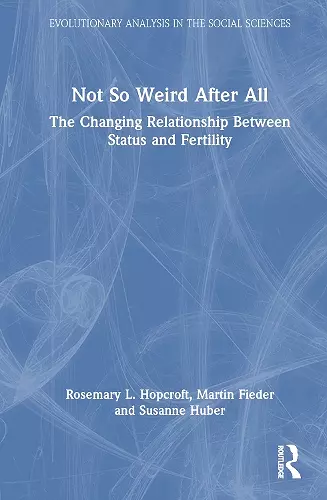Not So Weird After All
The Changing Relationship Between Status and Fertility
Rosemary L Hopcroft author Susanne Huber author Martin Fieder author
Format:Hardback
Publisher:Taylor & Francis Ltd
Published:26th Mar '24
Currently unavailable, and unfortunately no date known when it will be back
This hardback is available in another edition too:
- Paperback£36.99(9781032732886)

This is the first book to fully examine, from an evolutionary point of view, the association of social status and fertility in human societies before, during, and after the demographic transition. In most nonhuman social species, social status or relative rank in a social group is positively associated with the number of offspring, with high-status individuals typically having more offspring than low-status individuals. However, humans appear to be different. As societies have gotten richer, fertility has dipped to unprecedented lows, with some developed societies now at or below replacement fertility. Within rich societies, women in higher-income families often have fewer children than women in lower-income families. Evolutionary theory suggests that the relationship between social status and fertility is likely to be somewhat different for men and women, so it is important to examine this relationship for men and women separately. When this is done, the positive association between individual social status and fertility is often clear in less-developed, pre-transitional societies, particularly for men. Once the demographic transition begins, it is elite families, particularly the women of elite families, who lead the way in fertility decline. Post-transition, the evidence from a variety of developed societies in Europe, North America and East Asia is that high-status men (particularly men with high personal income) do have more children on average than lower-status men. The reverse is often true of women, although there is evidence that this is changing in Nordic countries. The implications of these observations for evolutionary theory are also discussed. This book will be of interest to students and researchers in the social sciences with an interest in evolutionary sociology, evolutionary anthropology, evolutionary psychology, demography, and fertility.
"Researchers have been finding more and more evidence that, among and within countries that have already passed through what’s generally called demographic transition, the old, positive relationship between status and affluence on the one hand and number of children on the other is beginning to reestablish itself…In Not So Weird After All: The Changing Relationship Between Status and Fertility, sociologist Rosemary L. Hopcroft of the University of North Carolina at Charlotte and anthropologists Martin Fieder and Susanne Huber of the University of Vienna look at the evolutionary background and implications of the change."
Justin Fox, Bloomberg Opinion columnist, former editorial director of the Harvard Business Review, and author of The Myth of the Rational Market (2010).
ISBN: 9781032732572
Dimensions: unknown
Weight: 453g
116 pages